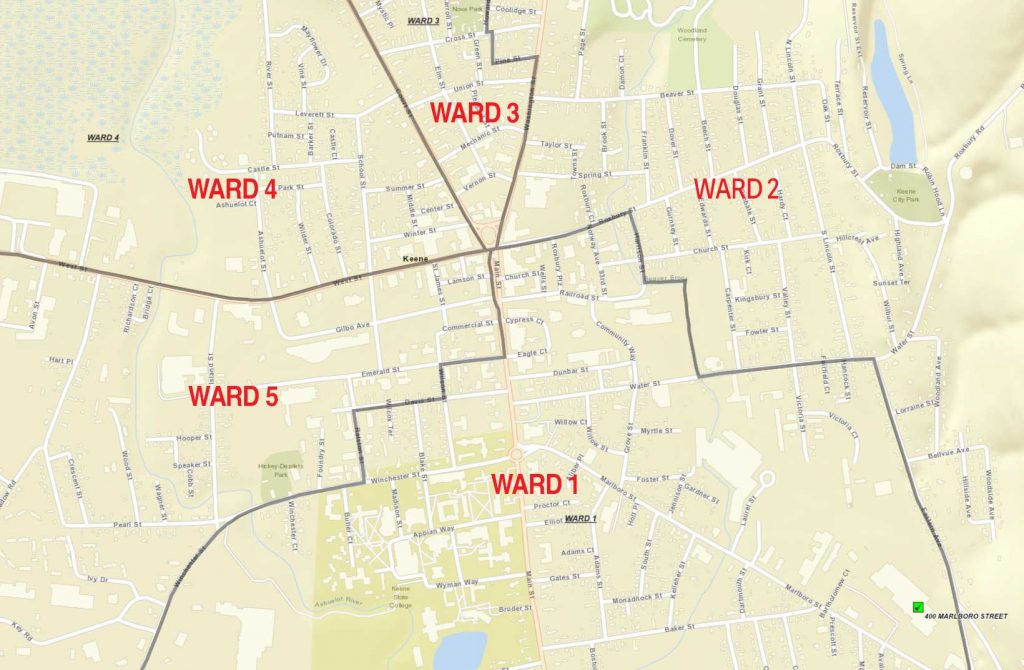
What do I need to do to register ?
In general, in order to register to vote you may be requested to provide some or all of the following:
- Picture ID: Proof you are who are such as drivers license, student ID, etc.
- Date of Birth: Proof that you are 18 such as diver’s license or birth certificate.
- Citizenship: Proof of Citizenship such as birth certificate or US passport (the best).
- Domicile: Proof of where you live such as a utility bill with your name on it.
State requirements vary so be sure to check your state requirements. If you chose Option 3 below (Register at the polls in Keene), the College has worked with the City Clerk’s Office to verify domicile and you have the right to sign affidavits to verify date of birth and citizenship.
Voting is your right!
How do I register? You have options!
OPTION 01: Absentee Ballot
If you have already registered in a different city in New Hampshire or a different state, you can request an absentee ballot from that municipality. Click here is a link for information about requesting absentee ballots from outside of Keene.
OPTION 02: Register in Keene Before Election Day
If you are planning to vote in Keene, head down Main Street to the City Clerk’s Office. Visit the City Clerk’s Website for directions and hours.
OPTION 03: Register at the Polls
If you have not registered, you can still vote!
New Hampshire allows for Election Day Registration!
The Keene State College American Democracy Project will be sponsoring transportation to the polling stations in Keene. The vans and buses will begin leaving campus at 8:00 a.m. and will run until 6:45 p.m. or until all students, faculty, and staff have been returned from the polling stations. The vans and buses will depart and return to the Elliot Lot behind the Media Arts Center. Stop by for coffee and donuts in the morning and food trucks starting at 11am!
If you can provide proof of age, citizenship and domicile it will make the registration process go quickly:
- Age — Driver’s license/Picture ID with date of birth
- Citizenship — Birth Certificate (a picture of your birth certificate will work) or Passport
- Domicile —
The College verifies domicile for all on campus students and off-campus students who have shared their address with the College. If you live off-campus and are unsure if the College has your off-campus address a utility bill, bank statement, lease or mortgage with your name and the current address will be accepted as “proof of domicile.”
What if I don’t have all the documents?
If you cannot produce the documents listed, you can sign a “Challenged Voter Affidavit” and you CAN still vote. Anyone who uses this method will receive a verification letter from the Secretary of State’s Office requesting confirmation that you voted in the election.
Let your voice be heard! Get out and vote! Don’t forget to get your “I Voted” sticker!
Still have questions…?
If you have questions about registering to vote, please check out City of Keene and the NH Secretary of State’s Office. If you would like to talk to someone at Keene State reach out to Kim Schmidl-Gagne (kgagne@keene.edu).
Voting Ward Map
On campus is ward 1
Address: Blastos Community Center, 400 Marlboro Street, Keene NH 03431
Mills and Acadia Ward 5
Address: Monadnock Covenant Church, 90 Base Hill Road, Keene, NH 03431
Other parts of Keene consult the Polling and Wards Map
Link to City of Keene Polling and Wards Map
Link to Voting Ward List by Street:
Street List 2022_Post-Redistricting
City of Keene / Voting Information


The American Democracy Project
The American Democracy Project (ADP) is a multi-campus initiative focused on higher education’s role in preparing the next generation of informed, engaged citizens for our democracy. The project began in 2003 as an initiative of the American Association of State Colleges and Universities (AASCU). The goal of the American Democracy Project is to produce graduates who are committed to being active, involved citizens in their communities. The 250 participating colleges and universities, as members of the American Association of State Colleges and Universities, have been described as “Stewards of Place.” As today’s undergraduates complete their studies and return to their communities, universities must prepare the next generation of citizens to become tomorrow’s “Stewards of Place.”